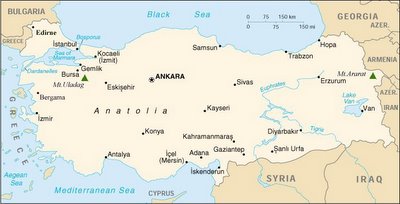Happy Turkey Day

I think that as the 21st Century unfolds, Turkey will be seen as one of the most important nations in the world. It's the only strictly secular Islamic nation (I think -- Jordan?), the only Islamic member of NATO, and wants to join the European Union. There's no doubt that there are extremely significant gaps in the Turkish view of civil liberties, but in other ways it's been among the most forward-thinking and pro-Western nations in the region for many years.
A few years ago I read Crescent & Star: Turkey Between Two Worlds by Stephen Kinzer, and I have to recommend it to anyone interested. Here's a Booknotes interview with Mr. Kinzer from 10/21/2001 (that is, six weeks after 9/11) which is very instructive. Interview excerpts:
At the moment, Turkey is going through a period of self-examination and trying to decide if it's ready to complete its march toward democracy. It already is the most democratic Islamic country in the world and only country in the world that can call itself, with any justification, a Muslim democracy, so that makes this a fascinating place at any time.
As a result of what is happening in the world right now, Turkey's importance has suddenly mushroomed. Turkey has a big role to play in what's going to be happening over the next weeks and months in central Asia and probably even an eq--a greater role in the long-term future, as it seeks to set a counterexample in the Islamic world to the message that we're getting from the cave.
Turkey brings some very unique and valuable assets to the table when it comes to participation in this anti-terror coalition. First of all, Turkey holds a special role in the Islamic consciousness as a result of the Ottoman Empire and as a result of its very central geography. So Turkey can play a role that Christian countries cannot.
Secondly, Turkey has a long history of involvement in Afghanistan. Not only is it the chief sponsor of one of the principal components in the Northern Alliance, but it has intelligence and experience over many years of training soldiers and having diplomats and having projects on the ground in Turkey. There is no other country who--which has the access to the kind of intelligence experience in Afghanistan that Turkey does.
It's also very interesting to imagine the role that Turkey can play on the ground in Afghanistan in a post-Taliban environment. It is ideally placed because of its heritage, and certainly because of its religious foun--foundation, to go into Afghanistan without arousing the hostility that some other kinds of forces would. This is another role that Turkey is now equipped to play better than any other country in the world. Turkey is the only Muslim country in NATO. And it is the NATO country closest to this theater of operations. It's only one country away from Afghanistan.
So Turkey will play a role in the first stage of this conflict, which will be to depose the Taliban. It will play a role in the transitional phase, which will be to stabilize the country, pob--probably by participating and, I wouldn't be surprised, leading a peacekeeping multinational force under the auspices of the United Nations or some other body. And then it will go on to play what I described earlier as perhaps its most important role, which is helping to reshape not just the consciousness in Afghanistan, but the Islamic approach in--in a wider world.
It will have particular resonance in Pakistan. There is actually a very interesting relationship there. The Pakistanis, who were becoming restive under British rule in the 1920s and '30s, looked to Turkey as an example. They were inspired in many ways by Ataturk. And Jinnah, the founder of the modern Pakistani state, was a great admirer of Ataturk. In addition to that, President Musharraf of Pakistan is a military officer who was trained in Turkey. He speaks Turkish. And I believe, like many of the people of his class and background in Pakistan, he also sees Turkey as a model for what countries can be if they want to embrace Islam as a guidance for--as a guide for personal life, but isolated from influence over state power.
The whole interview really is worth reading or watching if you have the opportunity.
One thing I'd like to do is find a good biography of Kemal Ataturk. Any suggestions? This guy fascinates me. He was the guy who essentially forced Turkey out of centuries-old, Eastern-oriented ways of doing things and into modern, Western-oriented ways of doing things. Like any social planner, he stepped on a lot of people's rights doing so, and like any society, there were plenty of Turks who resisted change with every fiber of their being. Also, don't mention his name to our friends down under... They celebrate ANZAC Day in honor of the Australians and New Zealanders who died at the Battle of Gallipoli in WWI, when Ataturk (then Mustafa Kemal) was directing the battle against them. (Check out the very good Peter Weir film adaptation of that story, starring Mel Gibson.) (One of these days I need to blog on my observations of Mel Gibson's anti-British bias in many of his films. I'm surprised he didn't suggest that Pontius Pilate was Chancellor of the Exchequer.)
For more contemporary touristy stuff (I've never been there, btw) check out this installment of the excellent Globe Trekker travel series.
Update: Here's a bunch of links from the Turkish government.

Happy Turkey Day!










0 Comments:
Post a Comment
<< Home